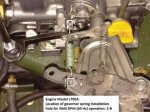Lostranger
Member
- 32
- 0
- 6
- Location
- Marion, NC
I’ve been using an MEP 831a as backup for our off-grid solar system for four years. It has always given trouble, but the problems were less after I bought a governor control module from a member of this forum. His name may be Klopp.
Three years ago, I bought a second machine for backup. It was cheap, but it had starter trouble, and it had power to the courtesy outlet, but never at main bus. In a short while, the engine stopped working, and I moved it to storage.
About a month ago, what I think is the inverter of the first machine made a rapid series of popping sounds, then it quit making power.
I wasted a lot of time trying to start the second machine. Now I have put the motor from the first machine into the second. Engine starts easily and runs best ever, but still no power at main bus.
I swapped a large relay from inside main compartment. I also swapped toggle switch from control panel and all three relays from behind control panel.
Any thoughts? Help greatly appreciated. I’m also in the market for a starter. I have one that does not work and one weak one.
Jim in NC
Three years ago, I bought a second machine for backup. It was cheap, but it had starter trouble, and it had power to the courtesy outlet, but never at main bus. In a short while, the engine stopped working, and I moved it to storage.
About a month ago, what I think is the inverter of the first machine made a rapid series of popping sounds, then it quit making power.
I wasted a lot of time trying to start the second machine. Now I have put the motor from the first machine into the second. Engine starts easily and runs best ever, but still no power at main bus.
I swapped a large relay from inside main compartment. I also swapped toggle switch from control panel and all three relays from behind control panel.
Any thoughts? Help greatly appreciated. I’m also in the market for a starter. I have one that does not work and one weak one.
Jim in NC



